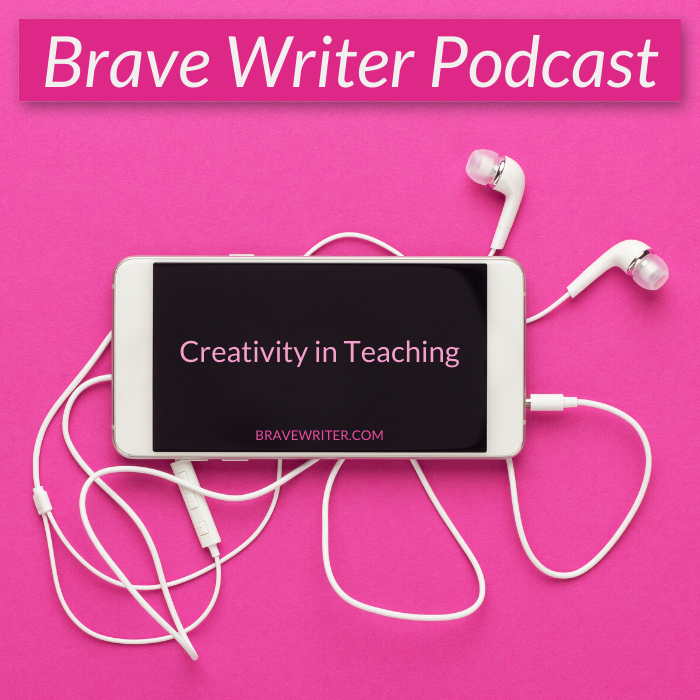Podcast: Creativity in Teaching

Are you one of those people that thinks you just aren’t inventive enough to imagine creative learning experiences?
We tend to think of creativity as something in the arts or something that is crafted—maybe even cooking, woodworking, and gardening. There’s a belief that creativity is attached to the imagination, and when we hear that word we are immediately thrust into the world of storytelling. It’s hard to summon a different definition for creativity and imagination—but that’s just what we’re going to do.
Along with the true definition of creativity and imagination, I will walk you through the five stages of creativity in teaching so that anyone who believes “I am not a creative person” will be able to conjure creative ideas.
Listen to the Podcast
Show Notes
Redefining “Creative” and “Imagination”
When you think about the word “creative,” look at the root word “create.” We’re talking about the art of creating in a habitual way. It is not limited to the arts. Anyone who’s worked in a scientific lab can tell you that it is a place filled with creativity.
It takes a mind open to possibility to create. Creativity, in the way we are talking about it here, is in the capacity to generate a new idea: To take the resources you’ve been given and to use them, exploit them, enjoy them, and employ them in a fresh way.
And what about imagination? You may think it’s about storytelling, but imagination is simply the capacity to picture in your mind what isn’t as though it is. It is the process of bringing into reality something that does not yet exist. You are taking bits and pieces of what already exists and combining them, mentally, to create something entirely new.
The main reason to use the tools of imagination and creativity in teaching is to bring into being a vehicle for learning that did not exist before. When your child hits the brick wall of struggle, resistance, or tedium, creativity and imagination are your best friends. They allow you to bring a new, refreshed point of view to the learning you are asking for from your kids.
The 5 Stages of Creativity in Teaching
1. Saturation
There is no creativity without saturation. For example, those professionals who are labeled “creative athletes” are those that are so skilled and so deep in the sport that their minds and bodies are able to imagine new ways to approach the same pass, shot, or putt. They have a well of experience that they are able to draw from and that leads to a wider variety of possibilities available to them. You need to do this with whatever you are hoping to learn: Dive deep into the topic, sit with the problems, and you will begin to identify the possibilities for bringing the subject to life for your child.
2. Incubation
Once you’ve saturated, give yourself some time to imagine possibilities. What would it be like for your child to understand their times tables? What would it be like for them to enjoy history? Give yourself permission to think of the outcome that you want to see in your child’s educational experience—and think of what actually gets you there. Find a way to make the subject meaningful.
3. Leap of Faith
Now that you’ve come up with the ideas, you have to put them into action. This is the part that people see that makes them think “I’m not creative.” What you are seeing is only the visible part of hours of saturation and incubation. You will have to improvise, but that’s what creativity takes. Do not delay taking action because you do not have everything you need. You need to chase the inspiration and momentum while you have it.
4. Activate
Get busy gathering supplies, modeling activities, reading your idea to your kids, supplying them with the technology they need. Get in gear with your kids and make sure they have everything they need to follow through with those ideas. If you are invited to participate (and it is an honor if you are), do it. You are now modeling learning to your child and helping them internalize the principles you’re hoping they learn.
5. Evaluate
Reflect and record what happened. Look at what happened, identify what learning took place, and find out what worked and what didn’t. And then iterate. Add this to the pool of potential experiences to draw from as you look to create in the future.
Creativity can be messy. It can—and likely will—lead to failures. But when you are already hitting roadblocks, trying something new is always worthwhile. Remember: We can all be creative and use our imaginations if we put in the work and follow the process.
Resources
- Want help getting started with Brave Writer? Head over to bravewriter.com/getting-started
- Sign up for the Brave Writer Newsletter to learn about all of the special offers we’re doing in 2020 + you’ll get a free 7-Day Writing Blitz guide just for signing up: http://go.bravewriter.com/writing-blitz
Connect
- Instagram: instagram.com/juliebravewriter
- Twitter: twitter.com/bravewriter
- Facebook: facebook.com/bravewriter


















